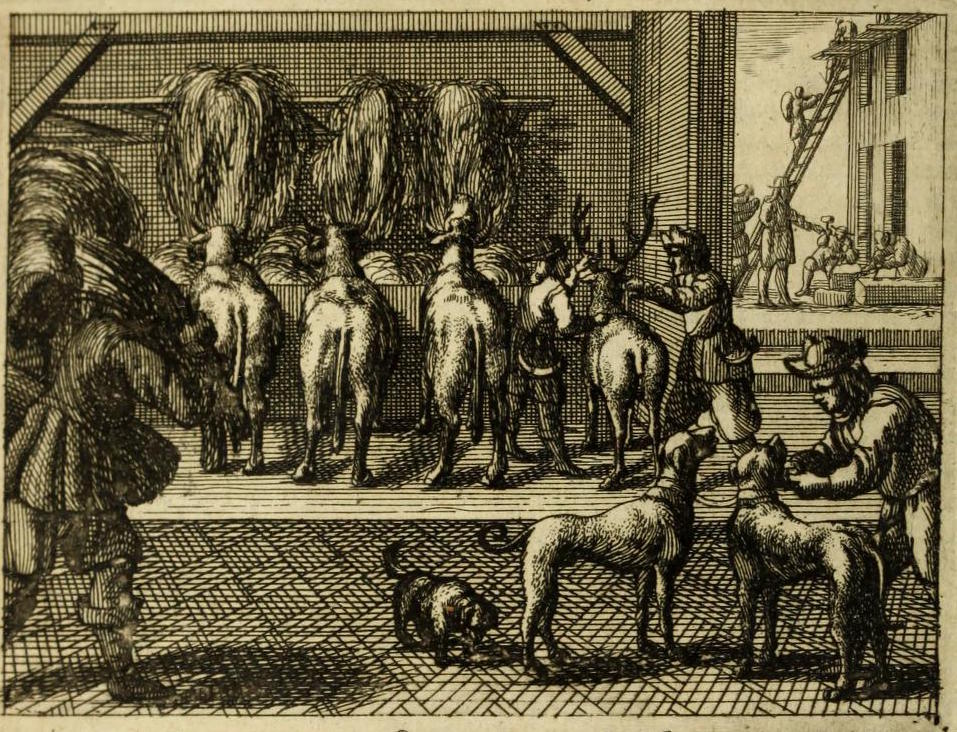
2.08. THE STAG AND THE OXEN.
A Stag unharbour’d by the hounds,
Forth from his woodland covert bounds,
And blind with terror, at th’ alarm
Of death, makes to a neighb’ring farm;
There snug conceals him in some straw,
Which in an ox’s stall he saw.
“Wretch that thou art!” a bullock cried,
“That com’st within this place to hide;
By trusting man you are undone,
And into sure destruction run.”
But he with suppliant voice replies:
“Do you but wink with both your eyes,
I soon shall my occasions shape,
To make from hence a fair escape.”
The day is spent, the night succeeds,
The herdsman comes, the cattle feeds,
But nothing sees—then to and fro
Time after time the servants go;
Yet not a soul perceives the case.
The steward passes by the place,
Himself no wiser than the rest.
The joyful Stag his thanks address’d
To all the Oxen, that he there
Had found a refuge in despair.
“We wish you well,” an Ox return’d,
“But for your life are still concern’d,
For if old Argus come, no doubt,
His hundred eyes will find you out.”
Scarce had the speaker made an end,
When from the supper of a friend
The master enters at the door,
And, seeing that the steers were poor
Of late, advances to the rack.
“Why were the fellow’s hands so slack?
Here’s hardly any straw at all,
Brush down those cobwebs from the wall.
Pray how much labour would it ask?”
While thus he undertakes the task,
To dust, and rummage by degrees,
The Stag’s exalted horns he sees:
Then calling all his folks around,
He lays him breathless on the ground.
The master, as the tale declares,
Looks sharpest to his own affairs. [more info]
A Stag unharbour’d by the hounds,
Forth from his woodland covert bounds,
And blind with terror, at th’ alarm
Of death, makes to a neighb’ring farm;
There snug conceals him in some straw,
Which in an ox’s stall he saw.
“Wretch that thou art!” a bullock cried,
“That com’st within this place to hide;
By trusting man you are undone,
And into sure destruction run.”
But he with suppliant voice replies:
“Do you but wink with both your eyes,
I soon shall my occasions shape,
To make from hence a fair escape.”
The day is spent, the night succeeds,
The herdsman comes, the cattle feeds,
But nothing sees—then to and fro
Time after time the servants go;
Yet not a soul perceives the case.
The steward passes by the place,
Himself no wiser than the rest.
The joyful Stag his thanks address’d
To all the Oxen, that he there
Had found a refuge in despair.
“We wish you well,” an Ox return’d,
“But for your life are still concern’d,
For if old Argus come, no doubt,
His hundred eyes will find you out.”
Scarce had the speaker made an end,
When from the supper of a friend
The master enters at the door,
And, seeing that the steers were poor
Of late, advances to the rack.
“Why were the fellow’s hands so slack?
Here’s hardly any straw at all,
Brush down those cobwebs from the wall.
Pray how much labour would it ask?”
While thus he undertakes the task,
To dust, and rummage by degrees,
The Stag’s exalted horns he sees:
Then calling all his folks around,
He lays him breathless on the ground.
The master, as the tale declares,
Looks sharpest to his own affairs. [more info]
No comments:
Post a Comment